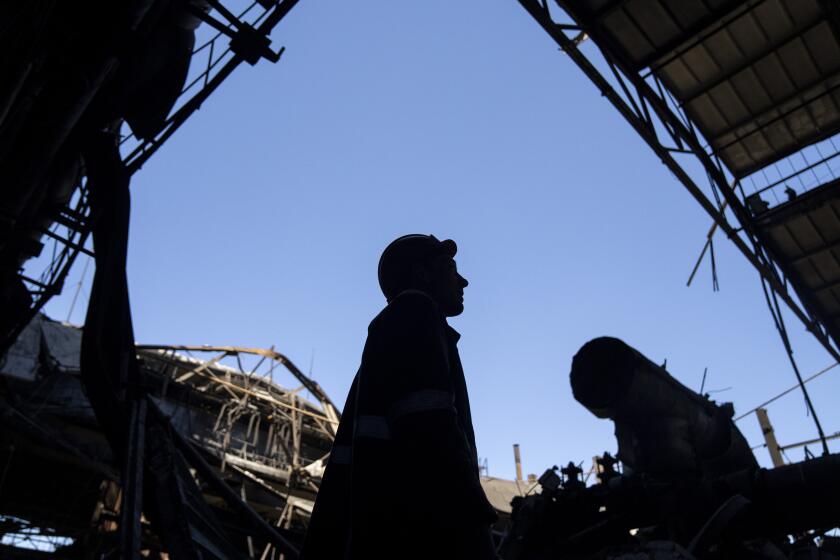Serbs Take U.N. Hostages After 2nd Air Strike
As NATO warplanes bombed Bosnian Serb positions Friday for a second day, angry rebel Serbs captured U.N. peacekeepers, used them as human shields and said they would die if more air strikes were launched.
The Bosnian Serbs, who had retaliated for Thursday’s NATO bombing with a shelling barrage of Bosnian Muslim enclaves, including a brutal assault on the town of Tuzla that claimed more than 70 lives, chained their U.N. hostages to potential targets and broadcast television pictures of the humiliation to the world.
The Bosnian Serb reprisals appeared to leave world powers stymied as to whether they should continue punishing the Serbs or retreat, a move that would once again undermine the United Nations’ authority.
No further air strikes were called Friday afternoon, after a morning raid in which jets from the North Atlantic Treaty Organization dumped 1,000-pound bombs on ammunition bunkers near Serbian headquarters in Pale. Six bunkers were damaged or destroyed, said U.S. Adm. Leighton Smith, commander of NATO forces in Southern Europe.
The Serbs responded immediately by stealing heavy weapons from a U.N. warehouse, shelling the Bosnian capital of Sarajevo, then, in brash defiance of the international community, seizing the hostages.
“The U.N. mission is on the side of our enemy, and we have to treat our enemy equally, whoever they are,” Momcilo Krjisnik, head of the Bosnian Serbs’ self-styled parliament, told a news conference in Pale.
Although officials differed on their figures, U.N. spokesman Alexander Ivanko said in a telephone interview from Sarajevo that a total of 145 U.N. peacekeepers and military observers were detained or surrounded by Serbs by Friday night.
Gen. Ratko Mladic, commander of the Bosnian Serb army, told the U.N. commander for Bosnia, Lt. Gen. Rupert Smith, that the lives of the men are in danger.
“Mladic said that, if there are further [NATO] attacks, the U.N. [military observers] might also become casualties of NATO air strikes,” Ivanko said.
Twenty French soldiers were disarmed, loaded in a truck and driven to an unknown destination, U.N. officials said. Three others--a Czech, a Canadian and a Ukrainian--were shown on Bosnian Serb television chained and handcuffed to electrical posts and a munitions depot door.
Before being shackled, one of the men was able to communicate by radio with his home base in a chillingly dramatic exchange. “One person loaded his pistol, and he was trying to kill us,” the U.N. observer said in an even but strained voice. “I’ve been beaten up already. . . . Be advised, we are now handcuffed inside the car. We are immobilized inside the car. . . . “Can you confirm that no further bombing will be carried out today? . . . We’ve been advised the next bomb that falls, we’ll be killed.”
A Bosnian Serb soldier then said into the radio, speaking in English: “Three U.N. observers are now at the site of the warehouse. Any more bombing, they’ll be the first to go. Understood?”
U.N. and U.S. officials said Friday that the possibility that the Bosnian Serbs would take human shields had figured into their calculations of the enormous risks before the first attack on Thursday. Weary of its peacekeepers being ignored, ridiculed, targeted and even killed, U.N. officials said they opted for a tougher stance against growing Bosnian Serb defiance.
“As the result of the increasing seriousness of the situation, this admittedly risky strategy was adopted,” Fred Eckhard, spokesman for U.N. special envoy Yasushi Akashi, told a news conference at U.N. mission headquarters in Zagreb, Croatia.
Now the United Nations will be faced with a new question: Is it willing to accept casualties among its forces in the name of getting tough?
Late Friday, France--which has the largest number of troops in Bosnia--gave a partial answer. U.N. Secretary General Boutros Boutros-Ghali emerged from a Security Council meeting and told reporters that he had taken a telephone call from the new government of French President Jacques Chirac.
Chirac insisted that the United Nations better protect its peacekeepers--including the French troops--or Paris will withdraw its forces from Bosnia.
The second bombing wave occurred even before a U.N.-set deadline for rebel Serbs to remove heavy weapons from a 12 1/2-mile exclusion zone around Sarajevo by noon Friday. The second air strike was ordered after the Bosnian Serb shelling of Tuzla, a designated “safe area” controlled by the Muslim-led government that is of strategic value because of a military airport there. At least 71 people--including small children and teen-agers--were killed and 150 injured when a single 130-millimeter artillery shell landed on a crowded promenade, the United Nations reported.
*
This was the single deadliest shelling attack in three years of war and shocked even grizzled veterans of Balkan bloodshed.
“I have no alternative but to respond to this dangerous situation that threatens the entire peace process,” Akashi said in ordering the use of air power, a step he had previously ruled out because of its likely repercussions.
Although saying air strikes are still an option, world leaders seemed to be at a loss for deciding the next step.
In Washington, President Clinton denounced the hostage-taking as “totally wrong” and called on Russian President Boris N. Yeltsin to pressure the Serbs to release the U.N. troops. Britain and Germany echoed the plea.
Yeltsin, through a statement released by the Russian news agency Itar-Tass, said he objected to the air strikes but would “do everything possible to stop military activity in Bosnia on the understanding that there would be no new strikes.”
Moscow has influence over fellow Slavic Serbs because of their shared cultural and historical ties. Itar-Tass said Yeltsin knew of the strikes several hours in advance and had warned Serbian leaders.
*
At the United Nations, French Ambassador Jean-Bernard Merimee, president of the Security Council this month, told reporters late Friday that the council “strongly condemns” the shelling of “safe areas” by the Bosnian Serbs and demands the immediate release of peacekeepers detained by them.
But the condemnation came in the weakest form possible--a statement read to the press. Condemnations of this kind are often issued as official statements of the council. But the world body did not do this because of objections by Russian Ambassador Sergei Lavrov in a closed council meeting. Lavrov angrily condemned the U.N. decision to bomb the Bosnian Serbs, diplomatic sources said.
In Washington, Secretary of State Warren Christopher called for a meeting of foreign ministers of the five-nation Contact Group to consider the deteriorating situation in Bosnia. U.S. officials said the session will probably be Wednesday in the Dutch resort town of Noordwijk because all five ministers--from the United States, Russia, Britain, France and Germany--plan to be there for consultations between NATO and the former Warsaw Pact countries.
The Pentagon ordered the aircraft carrier Theodore Roosevelt and the cruiser Hue City--carrying cruise missiles--to the Adriatic Sea, moving them into position to add substantially to NATO’s firepower in the region.
State Department spokesman Nicholas Burns said it is up to U.N. and NATO commanders on the ground to determine what happens next. But he said Washington backs firm action, despite the danger to U.N. troops.
Asked if the Administration supports further action even if it costs the lives of hostages, Burns said: “The United States remains prepared to join NATO in responding to U.N. requests, and that’s in the present tense and it means what it means.”
Times staff writers Richard Boudreaux in Moscow, Stanley Meisler at the United Nations and Norman Kempster and Doyle McManus in Washington contributed to this report.
(BEGIN TEXT OF INFOBOX / INFOGRAPHIC)
Striking Back
NATO warplanes struck for a second day in retaliation for Serbian shelling of U.N. -designated “safe areas” that left more than 70 people dead and 150 wounded. Several ammunition depots near Bosnian Serb headquarters in Pale were again targeted. In response, Bosnian Serb rebels have detained or surrounded 145 U.N. peacekeepers and military observers and told officials that the lives of the men are in danger.
NATO airplanes flew out of Aviana air base in Italy.
Ammunition depots were targeted by several NATO planes firing missiles and dropping 1,000-pound bombs.
More to Read
Start your day right
Sign up for Essential California for news, features and recommendations from the L.A. Times and beyond in your inbox six days a week.
You may occasionally receive promotional content from the Los Angeles Times.







